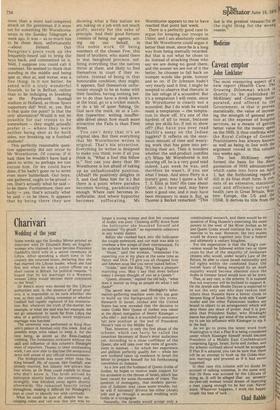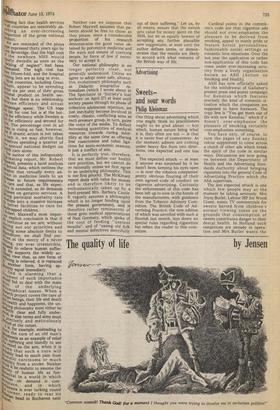Medicine
Caveat emptor
John Linklater
The most reassuring aspect of a new report (Health Care: The Growing Dilemma) which is shortly to be published bY McKinsey and Company Incorporated, and offered to the Government, is that it proves, statistically, the value of increasing the strength of general practice at the expense of hospital services, as a means of getting better value for the money spent on the NHS. It thus confirms what the Royal College of General Practitioners has always known, as well as being in line with the argument voiced in this column two weeks ago. The last McKinsey report formed the basis for the disorganisation of NHS administratioil which came into force on API .1, but the forthcoming report 15 still in its final draft form. It consists of an extensive, statistical. cost and efficiency survey 0f health care in Great Britain, Western Europe, the US and the USSR. It derives its title from the !arming fact that health services ' all countries are inexorably absorbing an ever-increasing 1),..4)Portion of the gross national nduct. k We are reminded of the pious L'oPe expressed thirty years ago by V Beveridge, that the high cost " the newborn NHS would siloidly dwindle as soon as the acklog of neglect" had been '!'lninated. The high cost has irl,s,ort fifteen-fold, and the hospital tting lists are as long as ever. [ill. ost countries, including Great Ltitain, appear to be spending ""ol-lt. six per cent of their gross ,4tienal product on health ser',lees, but there is no relationship 'tween efficiency and actual °rcentage spent. The US tops toe list for cost but is at the botk_ssi for efficiency while Sweden is 7 for efficiency and second for 'R. The percentage cost in all 4ses is rising so fast, however, inat, if drastic action is not taken halt it, we may shortly find brse Ives spending a quarter of 6,4 annual national budget on '1,Ith care alone. li'lle author of this indisputably 14einating report, Mr. Robert pk.stWell, presents a lucid analysis actual data, which outlines the va,aclox that virtually every ad
ce in medicine leads to an ease in future requirements
care and that, as life expeci4leY is extended, so do demands iqls;ease on geriatric services. A 4"ng perinatal mortality rate kiveloPs into a massive increase better facilities to care for inclicaPped children. ebert Maxwell's most import explicit conclusion is that if krenritinue as we are, without ft,,i,ng out our priorities and some absolute limits to nditure, we shall find our i1i pe !icivs at the mercy of a never 11 yet ever irresistible, and to relieve human suffer'i_lie supports the widely actru view that, as one form of ering is relieved, it is replaced e another form, having ap11,9Y equal immediacy. oirld it alarming that a Virnent of such importance oi'h'd fail to deal with the main he of the underlying he'a3s0Phical issues. When a itch project covers the care of a ii4n beings, their life and death ii .ealth and happiness, the unifYIng philosophy must either be optiettlY clear and fully under'Or else terms and aims must rrecisely and meticulously It...ad at the outset. 40,1s, for example, misleading to e`e the cure of an old man's 4,113nia as an example of relief i. 14 suffering and blandly to see It110„,rellef as the aim, when it is oba",n that such a cure will rosts°1Y lead to much pain from 4biric carcinoma or much Oui, l.tY from a stroke. Neither riet'! it be realistic to assume the Y of human life as funrOtal in a world in which otihic;'n on demand is cornLthaace, and in which oe Qs is is ever lurking round itler`i°rner, ready to rear its tINstan head in Bucharest next
Neither can we suppose that Robert Maxwell assumes that patients should be free to chose as they please, since a considerable proportion of his research demonstrates the good value obtained by preventive medicine and the ways and means of coercing people, by force of law if necessary, to accept it.
Our national philosophy is no longer perfectly clear, nor generally understood. Unless we agree to adopt some safe, alternative, evolutionary philosophy such as Didactic integrative rationalism (which I wrote about in The Spectator in 'Society's lost anchors' on April 27) at least until society passes through its phase of collective adolescent rejection, we just inevitably become involved in costly, chaotic, conflicting aims as each pressure group, in turn, gains the voice of the media. To deflect increasing quantities of medical resources towards curing infertility at the same time as offering free vasectomies and tubal ligations for socio-economic reasons, is just a conflict of aim.
It is perfectly true, therefore, that we must define our health care priorities, but we cannot do so rationally unless we first agree to an underlying philosophy. This is our first priority. The McKinsey report deals with value for money and is therefore likely to be enthusiastically taken up by a hard-pressed Mrs. Barbara Castle. It vaguely assumes a philosophy which is no longer binding upon the present government, and is therefore rather reminiscent of those grim medical appreciations of Nazi GermanY, which spoke of the cost of feeding "useless mouths", and of "easing old folk and mental defectives mercifully
out of their suffering." Let us, by all means, ensure that the nation gets value for money spent on the NHS, but let us equally beware of accepting any further plausible new suggestions, at least until the author defines terms, or demonstrates that the results are likely to accord with what remains of the British way of life.



































 Previous page
Previous page